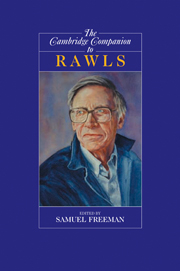Book contents
- Frontmatter
- Introduction
- 1 Rawls and Liberalism
- 2 For a Democratic Society
- 3 Rawls on Justification
- 4 Rawls on the Relationship between Liberalism and Democracy
- 5 Difference Principles
- 6 Democratic Equality
- 7 Congruence and the Good of Justice
- 8 On Rawls and Political Liberalism
- 9 Constructivism in Rawls and Kant
- 10 Public Reason
- 11 Rawls on Constitutionalism and Constitutional Law
- 12 Rawls and Utilitarianism
- 13 Rawls and Communitarianism
- 14 Rawls and Feminism
- Bibliography
- Index
3 - Rawls on Justification
Published online by Cambridge University Press: 28 May 2006
- Frontmatter
- Introduction
- 1 Rawls and Liberalism
- 2 For a Democratic Society
- 3 Rawls on Justification
- 4 Rawls on the Relationship between Liberalism and Democracy
- 5 Difference Principles
- 6 Democratic Equality
- 7 Congruence and the Good of Justice
- 8 On Rawls and Political Liberalism
- 9 Constructivism in Rawls and Kant
- 10 Public Reason
- 11 Rawls on Constitutionalism and Constitutional Law
- 12 Rawls and Utilitarianism
- 13 Rawls and Communitarianism
- 14 Rawls and Feminism
- Bibliography
- Index
Summary
Rawls offers what might be seen as three ideas of justification: the method of reflective equilibrium, the derivation of principles in the original position, and the idea of public reason. These can appear to be in some tension with one another. Reflective equilibrium seems to be an intuitive and “inductive” method. On one natural interpretation, it holds that principles are justified by their ability to explain those judgments in which we feel the highest degree of confidence. By contrast, the original position argument is more theoretical and more “deductive”: principles of justice are justified if they could be derived in the right way, institutions are just if they conform to these principles, and particular distributions are just if they are the products of just institutions. Justifications that meet the requirements of public reason need not have this particular form, but they are limited in a way that an individual's search for reflective equilibrium is not. The idea of public reason holds that questions of constitutional essentials and basic justice are to be settled by appeal to political values that everyone in the society, regardless of their comprehensive view, has reason to care about. This is more restrictive than the idea of reflective equilibrium, since not all of an individual's considered judgments, or even all of his or her considered judgments about justice, need meet this test.
- Type
- Chapter
- Information
- The Cambridge Companion to Rawls , pp. 139 - 167Publisher: Cambridge University PressPrint publication year: 2002
- 84
- Cited by

